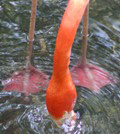» Site Navigation

1 members and 1,403 guests
Most users ever online was 47,180, 07-16-2025 at 05:30 PM.
» Today's Birthdays

» Stats

Members: 75,945
Threads: 249,146
Posts: 2,572,381
Top Poster: JLC (31,651)
|
-
-
-
Re: Does Albinism Affect the Animal's Growth?
I have an albino royal and I have not seen evidence that the recessive gene is causing an effect in the growth of the snake. I can't take a picture for you because I need to feed tonight and I don't mess with the snakes on feeding day!

~~ McKinsey~~
"Men have forgotten this truth," said the fox. "But you must not forget it. You become responsible, forever, for what you have tamed."
~The Little Prince; Antoine de Saint Exupery
-
-
Re: Does Albinism Affect the Animal's Growth?
I have not heard of albinism causing stunted growth or slower growth rates in reptiles.
My thoughts would be that nocturnal species with albinism are uneffected; however, diurnal reptile species may suffer slower growth due to less heat exposure because of the possible issues sunlight poses to 'white' reptiles. I remember reading that some albino/leucy lizards do not handle the sun as well as normals and can suffer 'sunburn' if not carefully monitored. For diurnal reptiles, it would seem......Less exposure to light = less exposure to heat = slower metabolism= slower growth. I will have to check to see if I can find the source....I think it may have been discussing albino tegus.
-
-
Registered User


Re: Does Albinism Affect the Animal's Growth?
I agree with Daniel,
Albinoism shouldnt effect nocternal species, and most species in captivity (the wild its a disadvantage unless in a snowy area). But Diurnal species that need UVB have trouble.
There have been a few clutches of Bearded Dragon eggs with Albinos, most die because of UVB radiation, and anyone that knows beardies knows there need and worship of UVB. They die without it, and the Albinos died because of it. Rumors are there is a few alive and almost adult in Austrailia in a private collection, and were under a strict UVB schedual, giving just enough to keep healthy, but not enough to kill them. Melanine is used to block out Sunlight, to prevent problems like that. For example in humans skin tones originated in areas according to sunlight over millions of years.
Some animals have less of a problem being albino, For example some Monitor species dont need UVB as much as other lizards, and can live without a problem (AKA Nerds Albino Monitors).
Anyway, the only reason that Albinoism would effect the growth or habits of a animal is if it gave a distinct disadvantage, In the wild its blending in, In captivity they have no need, so many are fine. If they dont have a layer to block the UVB, it causes problems.
Ben
-
-
BPnet Veteran

Re: Does Albinism Affect the Animal's Growth?
I have read horror stories about albino dogs. It sounds like an albino mammal usually has a harder time than its normal colored siblings.
As far as snakes go, i don't think many are too adversely affected, even the diurnal ones like corns. I have had a lot of friends lose albino corn babies to weird health issues, but as long as they are responsibly bred, i think some reptiles and most snakes are healthy as albinos. Just avoid sun loving species, I believe hognose are pretty safe. No pics, sorry! i want one but don't have one 
Just as a warning about dogs, some disreputable breeders will purposefully breed defective albinos and call them Rare & charge lots of money for animals that are born deaf or blind or with horrible behavior problems. Be very careful about buying from someone. As with reptile breeders, make sure the person is reputable and honest!
1.0 Het Piebald (Lycaeus)
1.0 Spider (V "Fawkes")
0.1 Piebald (Fia)
0.2 Pastel (Chalcomede & Daeneyrs "Dany")
0.1 orangebelly (Secha "Veruca Salt")
R.I.P my babies
Texas luecistic ratsnake (Ripley) 0.1
Ball Python (Ariadne) 0.1
Ball Python (Montreal) 1.0
-
-
BPnet Veteran


Re: Does Albinism Affect the Animal's Growth?
My bell albino leopard geckos grow slower than their het/normal counterparts. The albino geckos just don't seem to pick up on the worms as quickly for some reason. (I start my babies out on phoenix worms). By the time they are adults they are the same size as their normal/het counterparts, but they just don't start out as quickly.
-
 Posting Permissions
Posting Permissions
- You may not post new threads
- You may not post replies
- You may not post attachments
- You may not edit your posts
-
Forum Rules
|







 -Ryan Hardwikk
-Ryan Hardwikk
 Reply With Quote
Reply With Quote

